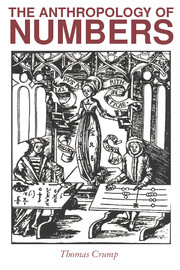Book contents
- Frontmatter
- Contents
- List of illustrations
- Preface
- Acknowledgements
- 1 The ontology of number
- 2 The cognitive foundations of numeracy
- 3 Number and language
- 4 Cosmology and ethnoscience
- 5 Economy, society and politics
- 6 Measurement, comparison and equivalence
- 7 Time
- 8 Money
- 9 Music, poetry and dance
- 10 Games and chance
- 11 Art and architecture
- 12 The ecology of number
- Notes
- References
- Index
- Cambridge Studies in Social and Cultural Anthropology
6 - Measurement, comparison and equivalence
Published online by Cambridge University Press: 05 June 2012
- Frontmatter
- Contents
- List of illustrations
- Preface
- Acknowledgements
- 1 The ontology of number
- 2 The cognitive foundations of numeracy
- 3 Number and language
- 4 Cosmology and ethnoscience
- 5 Economy, society and politics
- 6 Measurement, comparison and equivalence
- 7 Time
- 8 Money
- 9 Music, poetry and dance
- 10 Games and chance
- 11 Art and architecture
- 12 The ecology of number
- Notes
- References
- Index
- Cambridge Studies in Social and Cultural Anthropology
Summary
Function and cognition
Wherever the command of numbers has developed beyond the simple level attained by the Plateau Tonga of southern Africa or the Aranda of central Australia, it is tempting to assume that the incentive for such development is the need to use numbers for the purpose of measuring quantity. This essentially intuitive assumption is misleading. An author such as Stevens (1958: 383) who contends that early mathematicians did not readily discern the difference between measurement and mathematics' and that ‘man was usually more interested in empirical measurement than in mathematics’ can only base such an argument on certain special historical cases, such as that of Egypt in the time of the Pharaohs. Generally, the process of constructing a measurable continuum is only mastered at an advanced stage of cognitive development.
Measurement of quantity is an operational use of number, whose function must be defined largely in economic terms. Not every economy needs this function, because the need for it is determined by the existence of other socioeconomic institutions. In relation to measuring quantities of food, Richards (1939: 206), in her study of the Bemba of Zambia, states the point very clearly: ‘the incentive to measure food supplies depends largely on whether it is intended that they should be exchanged, or used as a means of assessing wealth, status or some other attribute valued in the particular society’.
- Type
- Chapter
- Information
- The Anthropology of Numbers , pp. 72 - 80Publisher: Cambridge University PressPrint publication year: 1990



